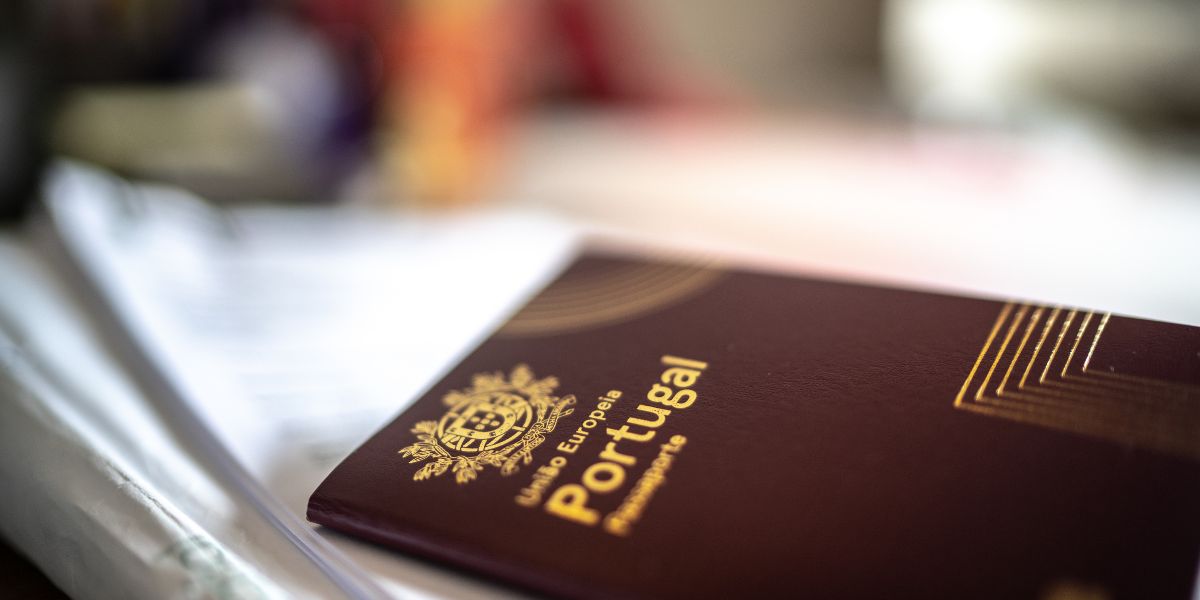Updated on dezembro 13th, 2024
How to Get Portuguese Citizenship [Guide 2025]
Portugal, a country known for its rich history, vibrant culture, and scenic beauty, also offers a highly sought-after prize – Portuguese citizenship.
This status not only grants the right to live and work in Portugal but also extends the privilege of moving freely within the European Union.
In recent years, there’s been a noticeable surge in the number of people seeking to become Portuguese citizens, driven by various factors including the nation’s favorable immigration policies and the allure of EU membership.
In this comprehensive guide, we’ll explore the different pathways to Portuguese citizenship, the application process, and the key benefits it offers.
Key Takeways
Indice
ToggleMultiple Routes to Citizenship: Portuguese citizenship can be obtained through descent, marriage, residency (naturalization), or investment (Golden Visa).
Dual Citizenship Allowed: Portugal permits dual citizenship, enabling individuals to retain their original nationality.
Naturalization Requirements: Involves a minimum of five years of legal residence in Portugal, proficiency in the Portuguese language, a clean criminal record, and evidence of integration into Portuguese society.
Residency Duration: For naturalization, a five-year residency in Portugal is required, which doesn’t need to be consecutive but within the last 15 years.
Citizenship Through Marriage: Available for those married to a Portuguese citizen for at least three years, with no mandatory residency period in Portugal.
Golden Visa Pathway: Offers a path to citizenship for non-EU investors, requiring a substantial investment and minimal residency in Portugal.
Descent Citizenship: Eligibility through Portuguese grandparents is possible, provided lineage is proven and ties to the Portuguese community are demonstrated.
Pathways to Obtain Portuguese Citizenship
Portuguese citizenship can be a complex affair, influenced by several factors including your country of origin, family background, and even marital status.
EU/EFTA residents typically find a more streamlined process compared to non-EU/EFTA individuals, due to the agreements in place within the European Union.
The 2006 amendment to the Portuguese Nationality Act further opened doors for non-EU individuals, reducing the residency requirement for citizenship through naturalization and marriage.
Additionally, Portugal’s historical connections to its former colonies facilitate a quicker citizenship process for residents from these regions.
Several routes lead to Portuguese citizenship, each with its own set of requirements:
- Naturalization/Residence Route: Perhaps the most common way, this route requires foreign residents to live in Portugal for a minimum of five years. The process involves proving integration into the Portuguese community, primarily through knowledge of the language.
- Descent or Birth: Individuals with Portuguese parents or grandparents, or those born in Portugal to foreign parents under certain conditions, automatically qualify for citizenship.
- Marriage: Marrying a Portuguese citizen can pave the way to citizenship without the need for a long residency period.
- Investment (Golden Visa): Significant investment in Portugal can lead to citizenship, with requirements including a minimum stay and financial investment.
- Former Colonies: Special considerations are given to individuals from former Portuguese territories.
- Sephardic Jewish Heritage: Descendants of Sephardic Jews expelled during the Inquisition have a path to citizenship.
Portuguese Citizenship Application Process
Navigating the application process for Portuguese citizenship can be daunting, but understanding the steps involved can simplify the journey.
Depending on the citizenship route, applicants may need to provide a variety of documents including birth certificates, proof of relationship to Portuguese relatives, evidence of residency, and language proficiency certificates.
Ensuring you have all the necessary documents is crucial to a successful application.
Proficiency in Portuguese is a key requirement for most citizenship routes as applicants typically need to demonstrate language skills at least at the A2 level on the CEFR scale. This reflects the importance Portugal places on cultural and linguistic integration.
Applications can be submitted at various places, including IRN offices in Portugal, Portuguese embassies or consulates abroad, and the National Support Center for the Integration of Migrants. Understanding the correct place to submit your application is vital.
The application process involves some fees and the processing time can vary. It’s important to have realistic expectations regarding the timeline.
Dual Citizenship and Legal Considerations
Portugal allows dual citizenship, enabling individuals to retain their original nationality while acquiring Portuguese citizenship.
This aspect is particularly attractive for many applicants. However, it’s important to verify if your home country permits dual citizenship to avoid any legal complications.
Obtaining Portuguese citizenship is more than just a legal process; it’s about becoming part of a community.
As a Portuguese citizen, you’ll enjoy various benefits including access to healthcare, education, and the right to work and live not only in Portugal but across the EU. Understanding these perks can help applicants appreciate the full value of Portuguese citizenship.
FAQs (Frequently Asked Questions)
How can I qualify for Portuguese citizenship?
Eligibility depends on various factors: by descent (if you have Portuguese parents or grandparents), through marriage or long-term partnership with a Portuguese national, by residing in Portugal for a specific period (usually 5 years), through adoption (if adopted by a Portuguese citizen), or via investment (such as the Golden Visa program).
Is it possible to have dual citizenship with Portugal?
Yes, Portugal allows dual citizenship. This means you can be a Portuguese citizen without giving up your original nationality. However, check if your home country also permits dual citizenship.
What are the requirements for naturalization as a Portuguese citizen?
For naturalization, you must have legally lived in Portugal for at least five years, demonstrate proficiency in the Portuguese language, have a clean criminal record, and show ties to the Portuguese community.
How long do I need to live in Portugal to be eligible for citizenship?
Typically, you need to live in Portugal for five years to be eligible for citizenship through naturalization. The years do not need to be consecutive but must fall within the last 15 years.
Can I obtain Portuguese citizenship through marriage?
Yes, if you are married to a Portuguese citizen for at least three years or in a long-term relationship, you can apply for citizenship. This route doesn’t require residency in Portugal but may require demonstrating ties to the Portuguese community.
What are the benefits of having Portuguese citizenship?
As a Portuguese citizen, you can live, work, and study freely within the EU, access public healthcare and education in Portugal, and travel visa-free to many countries. You also gain voting rights in Portugal.
Are there any language requirements for obtaining Portuguese citizenship?
Yes, you need to demonstrate proficiency in the Portuguese language, typically at the A2 level on the CEFR scale, especially for naturalization.
Can I claim Portuguese citizenship through my grandparents?
Yes, you can claim citizenship by descent if one of your grandparents is Portuguese, provided you can prove your lineage and demonstrate ties to the Portuguese community.
Conclusion
In conclusion, obtaining Portuguese citizenship can open a world of opportunities. It’s a gateway to living in a culturally rich, historically significant, and economically stable EU country.
Whether you are eligible through descent, marriage, residency, or investment, each path to citizenship is a journey towards becoming an integral part of the Portuguese community.
With the right preparation, understanding of the requirements, and a bit of patience, this journey can lead to a rewarding destination.
Do you want to know more about issues on global mobility in Portugal?
Schedule a call with one of our lawyers in Portugal clicking in the button below.


